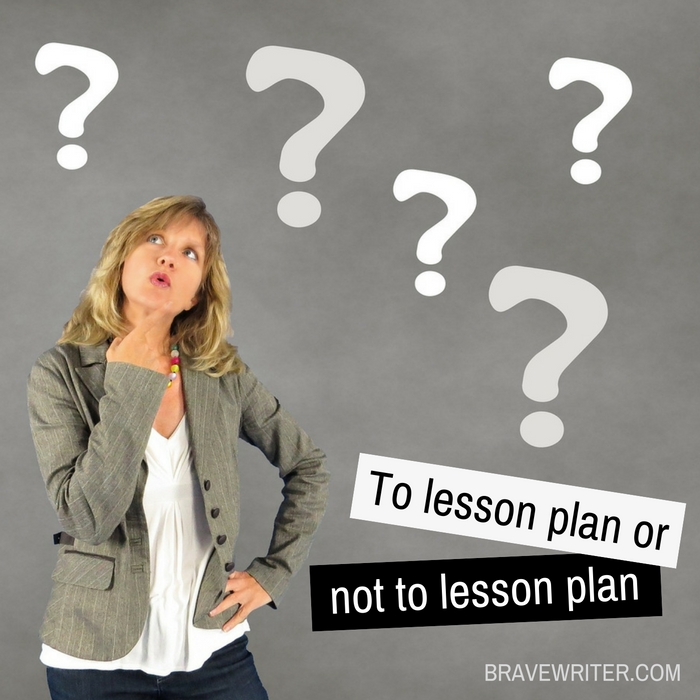To lesson plan or not to lesson plan?

One of the greatest pleasures in life is to have someone else prepare a pleasurable experience for you. For instance, when I eat dinner at someone else’s home, the food just tastes better, the whole experience is elevated to “special,” and I find myself relaxed and happy before the dinner begins, simply in anticipation.
Don’t get me wrong. I enjoy making a quality meal too. The tinkering with the ingredients, the paging through the cookbook, the skillful braising and simmering and broiling—these all help me invest in the meal, and I love the feeling of being a confident, competent cook. Still, even though I have taught myself to cook, and have enjoyed the effects of my cooking, I love meals cooked for me—whether at a friend’s home or a restaurant. There’s a different kind of happiness that comes from that experience.
Two modalities of learning
- Self-teaching to become a competent student of any subject area
- Benefiting from the well-prepared lesson offered by a caring parent.
In toggling between independent learning (the kind a child initiates and continues on his own) and lessons (the kind organized by you), your child will become a well-rounded, educated person. He’ll have the power and skill to teach himself (such a gift!), but he’ll also receive the gift of a lesson well-prepared.
Self-guided instruction is a popular motif in home education. It’s a fabulous goal of it, too. Anyone who realizes that a little concerted effort and a willingness to explore/read/test ideas without the badgering of a schedule or a series of pop quizzes and tests, discovers the joys of being an autodidact. We love that our kids can and do teach themselves all manner of subjects and skills.
What about the other end, though? While our goals may be to create independent learners, we might also want to consider how especially pleasurable it can be to learn according to a carefully considered plan put together with love by a parent. I’m not talking about lectures and note-taking. I am talking about a plan—
- preparing in advance which books to read and how they will be read (aloud in a group or to one’s self),
- considering field trips that might be coordinated with the books,
- assembling materials for art or science projects that correlate with the time period of the books,
- identifying music or artwork from that era in history that could be shared to enrich the experience of the reading and exploring, and so on.
In other words, one of the most generous acts you can give as a home educator is to prepare a well-thought-out course of study in at least one subject area for the coming school year each quarter. It may be difficult to give that level of development to every subject for all ages, but you can most certainly select literature or a historical time period that will address the bulk of your children. You can coordinate various activities, readings, outings, and experiences to go with that illuminate some aspect of the subject area you intend to explore.
Your preparation of a series of “lessons” that combine kinesthetic activities with more passive modes of learning (listening, watching, reading) are often not only a relief to your child, but may also trigger two other extremely valuable responses from your child: gratitude and motivation.
Your young students may thank you for being so invested in their learning, grateful for the enriching way you open this new field of study to them (they’ll say things like, “That museum was cool!” and “Thanks for having a party about the Gold Rush!”), and they may be more motivated to explore the topic further—to learn about other aspects of this subject area.
Don’t hold back from preparing rich, well-plotted lessons. You can intersperse periods of independence, space to explore without a guide, and freedom to pursue personal interests that don’t particularly draw your other children. But at least once each quarter, for a month or so, give your children the gift of a well-conceived unit of study. Take some time to create them, to think them through, to purchase supplies, and put dates on the calendar.
Share your plans with your kids, get their ideas. Catalyze their imaginations in advance, the way a menu gets you excited about the coming meal.
You can do it! You can create a feast of learning for your children. You feel so much better when you do, when you have thought ahead. Even if not every immersive experiences turns out to be as captivating as you had imagined, many of them will be swimming successes! Revel in those.
Make quality learning meals for your children as your gift to their education. In turn, they will find themselves hungry to teach themselves more, even without your lead. This is the balancing act and beauty of homeschool.
Embrace it.



















Sounds like a perfect plan to me! Thanks for putting in writing.
[…] have chaos or not have chaos? Julie Bogart discusses the pros and cons of lesson planning in To Lesson Plan or Not to Lesson Plan at A Brave Writer’s Life in […]
Testosterone is converted to dihydrotestosterone (DHT) which slows down or stops hair growth and produces
weaker, shorter hair. Hair fall is a condition of losing hair from the scalp leading to
the generation of new hair. Alopecia areata is
an inflammatory condition which can make hair come out in patches or clumps.
Take a look at my web blog … hair restoration cleveland ohio